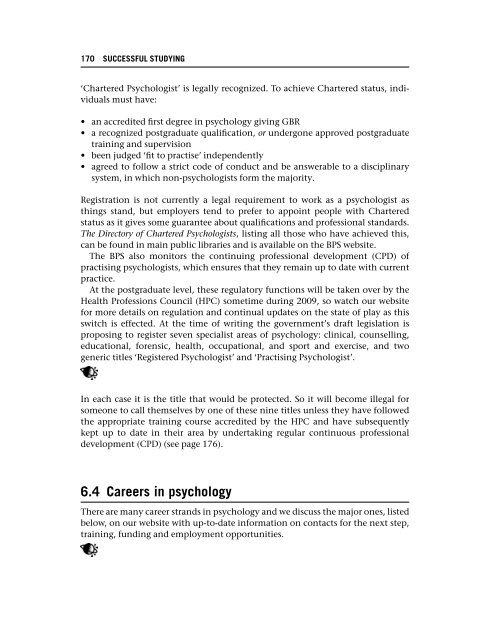Psychology - Forgot your username
Psychology - Forgot your username
Psychology - Forgot your username
You also want an ePaper? Increase the reach of your titles
YUMPU automatically turns print PDFs into web optimized ePapers that Google loves.
170 SUCCESSFUL STUDYING<br />
‘Chartered Psychologist’ is legally recognized. To achieve Chartered status, individuals<br />
must have:<br />
• an accredited first degree in psychology giving GBR<br />
• a recognized postgraduate qualification, or undergone approved postgraduate<br />
training and supervision<br />
• been judged ‘fit to practise’ independently<br />
• agreed to follow a strict code of conduct and be answerable to a disciplinary<br />
system, in which non-psychologists form the majority.<br />
Registration is not currently a legal requirement to work as a psychologist as<br />
things stand, but employers tend to prefer to appoint people with Chartered<br />
status as it gives some guarantee about qualifications and professional standards.<br />
The Directory of Chartered Psychologists, listing all those who have achieved this,<br />
can be found in main public libraries and is available on the BPS website.<br />
The BPS also monitors the continuing professional development (CPD) of<br />
practising psychologists, which ensures that they remain up to date with current<br />
practice.<br />
At the postgraduate level, these regulatory functions will be taken over by the<br />
Health Professions Council (HPC) sometime during 2009, so watch our website<br />
for more details on regulation and continual updates on the state of play as this<br />
switch is effected. At the time of writing the government’s draft legislation is<br />
proposing to register seven specialist areas of psychology: clinical, counselling,<br />
educational, forensic, health, occupational, and sport and exercise, and two<br />
generic titles ‘Registered Psychologist’ and ‘Practising Psychologist’.<br />
In each case it is the title that would be protected. So it will become illegal for<br />
someone to call themselves by one of these nine titles unless they have followed<br />
the appropriate training course accredited by the HPC and have subsequently<br />
kept up to date in their area by undertaking regular continuous professional<br />
development (CPD) (see page 176).<br />
6.4 Careers in psychology<br />
There are many career strands in psychology and we discuss the major ones, listed<br />
below, on our website with up-to-date information on contacts for the next step,<br />
training, funding and employment opportunities.






